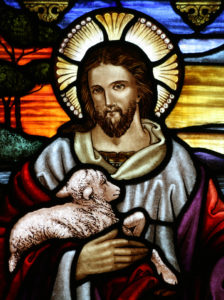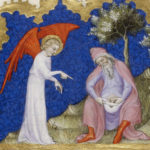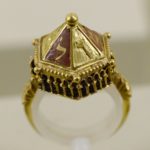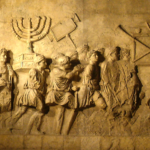To Jewish people, Elijah’s cup at the Passover Seder dinner symbolizes an expectant hope for the coming of Elijah to announce the Messiah.
Observant Jews practice the Passover Seder each spring, carefully following the ceremony outlined in the Haggadah (the Jewish Passover prayer book). The Seder recalls the Jews’ exodus (escape) from Egyptian slavery in the days of Moses (thousands of years ago).
Festival candles are lit with blessings. The Passover wine is blessed and poured for each participant at the table. An extra place setting and chair are set out for the prophet Elijah. According to the Old Testament, Elijah was transported alive in a flaming chariot to Heaven. He is expected to return to announce the coming of the Messiah. (Christians also believe Elijah is to return but to herald the second coming of Christ.)
Everyone at the table consumes four cups of the wine (at specific moments in the Seder service). No one touches Elijah’s cup.
When the entire meal has been completed, step-by-step, and the fourth helpings of wine have been poured, a child is asked to get up from the table and open the door for Elijah.
The Seder is closed with a prayer that Passover will be celebrated next year in Jerusalem, along with the Messiah’s victorious arrival.
In other words, the Jewish family’s eager anticipation of Elijah is closely correlated to their expectation of the Messiah, who will deliver them (even as they were delivered from Egypt, when the angel of death passed over the Jewish homes, and the firstborn of all Egypt were killed).
The New Testament Cup
To Christian believers, the much-sought Holy Grail, or the cup of Christ, is the New Testament counterpart to Elijah’s cup.
The New Testament of the Christian Bible refers to Jesus Christ as the Passover Lamb, whose sacrificed blood is central to the salvation of all who believe. Christians point to hundreds of Old Testament Messianic prophecies, as fulfilled by the life, death, and resurrection of Jesus of Nazareth.
 According to the book of Revelation, when Jesus returns to earth in His final victory, the Jewish people will recognize Him as their long-awaited Messiah and King of Kings.
According to the book of Revelation, when Jesus returns to earth in His final victory, the Jewish people will recognize Him as their long-awaited Messiah and King of Kings.
Jesus Himself put it this way: “Do not think that I have come to abolish the Law or the Prophets; I have not come to abolish them but to fulfill them. I tell you the truth, until heaven and earth disappear, not the smallest letter, not the least stroke of a pen, will by any means disappear from the Law until everything is accomplished.” (Matthew 5:17-18)
In other words, Jesus claimed to fulfill the Old Testament prophecy, for which God’s people were waiting. He drank the cup of suffering to atone for mankind’s sin and redeem the people. When believers partake in the Lord’s Supper, consuming the bread and drinking the cup (recalling His broken body and shed blood), they also mark a reminder of Elijah’s prophecy and the coming of Christ.
Anticipating Messiah’s Return
At the same time, the faithful eagerly await a far greater supper to come, the Marriage Supper of the Lamb. Jesus Christ Himself spoke of this at the Last Supper, as quoted in Matthew 26:29: “I tell you, I will not drink of this fruit of the vine from now on until that day when I drink it anew with you in my Father’s kingdom.”






